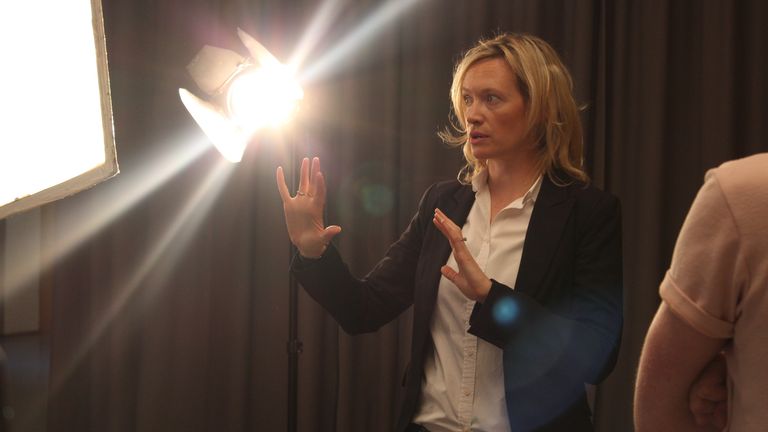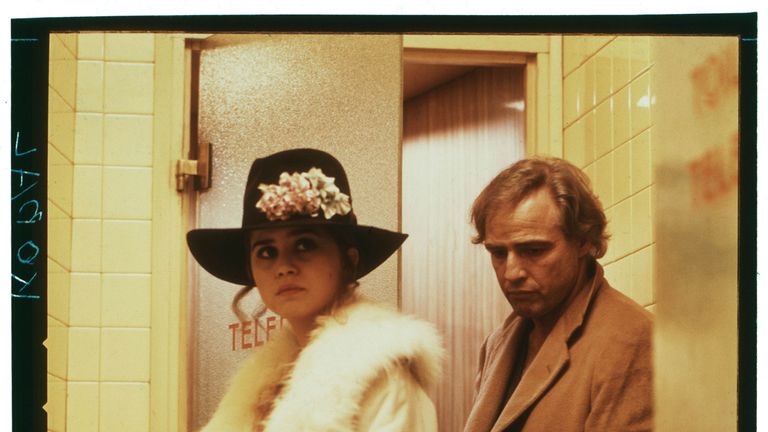Punch-ups, car chases, window leaps – for years, film and TV sets have employed stunt co-ordinators to oversee potentially dangerous scenes to make sure everyone involved is safe and feels comfortable.
So why is this such a relatively new thing for sex and intimacy?
While filming these sequences may not leave stars physically hurt, from Sharon Stone in Basic Instinct to Maria Schneider in Last Tango In Paris, there are well-publicised stories of the emotional scars some famous scenes have left on their stars. And earlier in 2021, Keira Knightley said she would no longer shoot intimate scenes for films or shows directed by a man and that she is not interested in “scenes where you’re all greased up and everybody is grunting”.
Following her leading actress win at the BAFTA TV Awards, for her portrayal of rape victim Arabella in the groundbreaking I May Destroy You, it was the unsung role of intimacy co-ordinator that Michaela Coel praised in her speech. For a show exploring issues of consent, Ita O’Brien’s presence on set, Coel said, was “essential”.
The role of intimacy co-ordinator has really come to the fore as a result of the Harvey Weinstein scandal in 2017 and the subsequent #MeToo movement, with directors and producers now paying a lot more attention to the way scenes of a sexual nature are shot and handled. And the issue has been highlighted again in recent weeks following allegations of misconduct made against actor and director Noel Clarke – which he “vehemently denies”.
“It seems crazy now that we’ve had stunt co-ordinators overseeing fights but we didn’t have a co-ordinator overseeing scenes that have intimacy, where people are just as likely to be mentally injured as physically if they’re not handled correctly,” intimacy co-ordinator Vanessa Coffey tells Sky News.
Her job is to speak to producers and directors about what they’re looking for, and actors about what they’re comfortable doing, and make sure everyone on set has an understanding of what is needed. Because, she says, “if you have the power to hire or fire somebody, you might not be getting a real answer from them as to whether or not they are happy… a lot of actors are worried that they’ll lose a job if they say no”.
Coffey has worked on series including Wolfe, War Of The Worlds, and I Hate Suzie, the comedy starring Billie Piper that was also up for several BAFTAs alongside I May Destroy You. One episode of the series is almost entirely focused on Piper’s character masturbating; with the wrong person in charge, it could have been incredibly uncomfortable to film.
Piper, she says, was “a wonderful person to work with because she comes with a lot of her own thoughts and ideas”, and they were all able to “have a bit of a laugh between takes, which certainly eases tension”.
Sex on screen in 2021
From Bridgerton and Adult Material to It’s A Sin and Normal People, there has been a lot of sex on screen in the past year or so. And it’s in no small part down to intimacy co-ordinators that we’re seeing less of the “male gaze” and porn-style sex, and it’s becoming more realistic.
“I do think it is changing,” says Coffey, of portrayals of sex on screen. “Because [intimacy co-ordinators] just work on intimate scenes… we start to really have an eye to how to craft these moments and think about what position will tell a particular story as well. Whereas, if you’ve just left actors to it in the past, to ‘go for it’, you end up seeing a little bit maybe inside the actors’ personal lives rather than, ‘what is the story of the characters we’re telling in this moment?'”
Coffey, who previously worked as a lawyer before training to be an actor, has been in the role officially since 2018, but was also working unofficially before that after being asked to look over a nudity rider – a contract between an actor and the production they are hired by that defines what will happen on set when filming nude – for a colleague.
She is now one of about 20 intimacy co-ordinators in the UK, but numbers look set to rise; following Coel’s speech, Time’s Up UK, a charity set up following the Weinstein scandal, has called for the creation of an independent standards authority, and for intimacy co-ordinators to become mandatory on film and TV sets.
The importance of intimacy co-ordinators
So why is the role so vital? BECTU (the broadcasting, entertainment, communications and theatre union) says there is a higher risk of bullying, emotional manipulation and sexual harassment on set in scenes with intimacy, and someone co-ordinating the scenes can help prevent this.
“We’ve seen some really powerful examples historically,” says Coffey, of scenes that have affected actors long after release. “One of the classics to talk about is Last Tango In Paris, the [Bernardo] Bertolucci film.
“Obviously that was in the ’70s, so we’re talking about well before the concept of intimacy co-ordinators was ever considered. But you had a performer in that [Schneider] who says afterwards that she felt raped, having done a scene where she didn’t consent to a lubricant being used. She didn’t know that that was what was going to be happening within the scene with the other performer.”
In an interview that resurfaced in 2016, Bertolucci admitted to conspiring with actor Marlon Brando to add butter without Schneider’s consent, saying: “I wanted her to react humiliated.” Schneider struggled with drug addiction and depression following the film. She died from cancer in 2011, aged 58.
In March, Sharon Stone’s memoir detailed the background of her famous “missing underwear” scene from 1992’s Basic Instinct; in an extract published in Vanity Fair, she claimed she was misled while filming.
“That was how I saw my vagina-shot for the first time, long after I’d been told, ‘We can’t see anything – I just need you to remove your panties, as the white is reflecting the light, so we know you have panties on’,” she said. In the end, Stone said, she agreed to the scene being used “because it was correct for the film and for the character”.
A representative for Basic Instinct director Paul Verhoeven said he did not want to comment on Stone’s claims.
There are, Coffey says, “some fairly extreme examples out there of people’s boundaries having been quite severely crossed – not just pushed, but absolutely crossed”.
She continues: “People walking away from productions talking about the awkwardness of something that happened… as well as having been on the receiving end of something that might go as far as being called assault.
“I speak to actors all the time who, even in very recent times, have come away from productions feeling that either they or that somebody on the production hadn’t done the right thing and that boundaries had inadvertently been crossed.”
And it is not just women, but men as well. “A lot of the men I’ve spoken to have been so worried about the boundaries they might inadvertently have crossed, too, not having had a really open conversation with, say, a female performer, for example.”
Where can actors and others in the industry go for help and advice?
In 2019, Directors UK issued guidelines for directing nudity and simulated sex in British television and film for the first time. In 2020, BECTU created a specific branch for intimacy co-ordinators. And there is also Time’s Up UK.
Following the allegations made against Clarke, there have been calls for more to be done. In a recent interview with Sky News ahead of the BAFTAs, Time’s Up UK chief executive Dame Heather Rabbatts said the charity had made progress since it was set up in January 2018, but there is always more that can be done.
“I think when we see allegations of any kind in the media about things that have gone on before in our industry, we do sit back and think, ‘how can we make this different going forward’, or ‘what have we already got in place that we’re not using?'” says Coffey.
“Within the [Directors UK] guidance, it says that you should never have to do a naked audition, for example. If you need to see what somebody’s body looks like, at most you should ask them to wear a bikini or trunks, and have a chaperone present. So there are safety precautions that we have in place that I think are worth highlighting.”
As the problems in the industry have come under the spotlight in recent months and years, a lot has been said about power dynamics on film and TV sets.
But it’s not power that’s the problem, says Coffey, it’s about how that authority is used. And that’s where an intimacy co-ordinator can help.
“To me, power is not a bad thing,” she says. “We have power dynamics on set and we have them for a reason and they’re there to keep people safe – it’s the abuse of power that’s a problem.”






